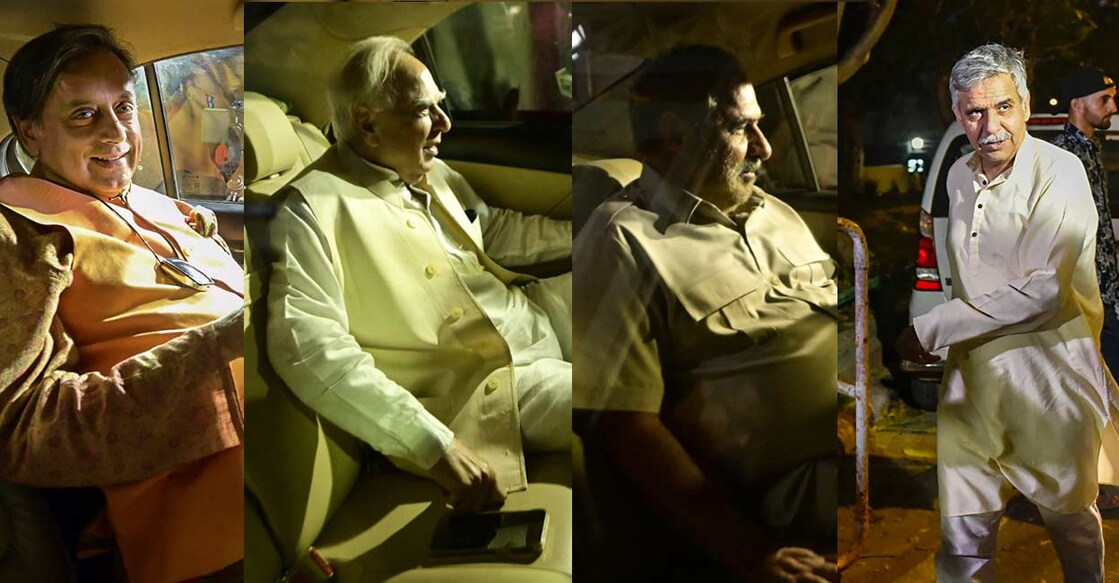As Congress struggles for survival, G-23's clout is looming over official faction

Mail This Article
In Congress, the number 23 has a different value these days. There's nothing surprising about it since the party has been getting its maths wrong election after election for years.
G-23, a group of reformists who called for sweeping changes in the party's leadership and style of functioning, is no more just 23. Visibly, its size has shrunken with a few leaders, who signed the explosive letter in August 2020, distancing themselves from the group.
However, the cause it stands for and the narrative it has set seems to have outgrown the official overview of the Congress' sad story.
The party's debacle in the recent state assembly polls has made the criticism raised by the rebel group all the more valid and stronger. The post-election scenario has revealed some tell-tale signs of the G-23 becoming more aggressive and its influence growing over the organisation.
The G-23 met twice after the poll, in what looked like a parallel party forum, even as the official Congress Working Committee meeting ended up churning out the usual drama.
The rebel group even made its meeting official by issuing a statement calling for 'collective and inclusive leadership.'

“We the… members of the Congress party met to deliberate on the demoralising outcome of the recent results of the Assembly elections and the constant exodus of both our workers and leaders. We believe that the only way forward is for the Congress party to adopt the model of collective and inclusive leadership and decision-making at all levels,” the statement, signed by 18 leaders, said.
In normal circumstances, the parallel meeting would have amounted to anti-party activity and attracted disciplinary action.
However, the party is so weakened at the moment that it cannot even think of angering the group further.
There has been no voice of reprimand, unlike in August 2020 when the G-23 wrote their letter, except some loyalty posturing by a couple of leaders.
Notably, the Gandhi family has been more accommodative of the rebel leaders this time – Former Haryana Chief Minister Bhupinder Singh Hooda had a meeting with Rahul Gandhi while Ghulam Nabi Azad could meet Sonia Gandhi.
“The party cannot afford one more split at this juncture. What we need is a working structure accommodating all,” an AICC source told Onmanorama. More prominent leaders, who used to be with the official leadership, have started feeling that the G-23's arguments are justified, according to the source.
“It is true that there is a sense of dissatisfaction among a wide section of leaders. The G-23 is in touch with many prominent leaders across the country. Prominent leaders like Kamal Nath and P Chidambaram have been moving closer to the G-23,” the source outside the rebel group said.
A member of the G-23 collective confirmed this to Onmanorama. “Yes, we are in contact with Kamal Nath, but the results are not clear yet. Chidambaram is more or less ok with the G-23's ideas,” he said.
The G-23 has made its target clearer this time. “None of us have any problem with Sonia Gandhi. There's no point in asking her to quit when the internal elections are scheduled to take place in a few months. But the problem is that even when Mrs Gandhi is there, someone else who is not in any position is taking key decisions,” the G-23 member said, without naming Rahul Gandhi.
“That's why we keep saying the party needs a full-time president. None of us has said that we don't need someone from the Gandhi family. What we say is that the president need not be necessarily someone from the family. Anyway, Rahul Gandhi has been reluctant to take up the post again after he quit it in 2019,” the leader said.
Asked about the group's plan and the strategy it will adopt in the internal elections, the leader said it will all depend on the party's response to the suggestions it has put forward.
He ruled out the possibility of a split in the party. “G-23 doesn't want a split. We have made it clear to the leadership also. We are not contemplating a split. What we want is to correct the aberrations in the party. If it doesn't succeed, then we will decide the future course of action,” he said.


